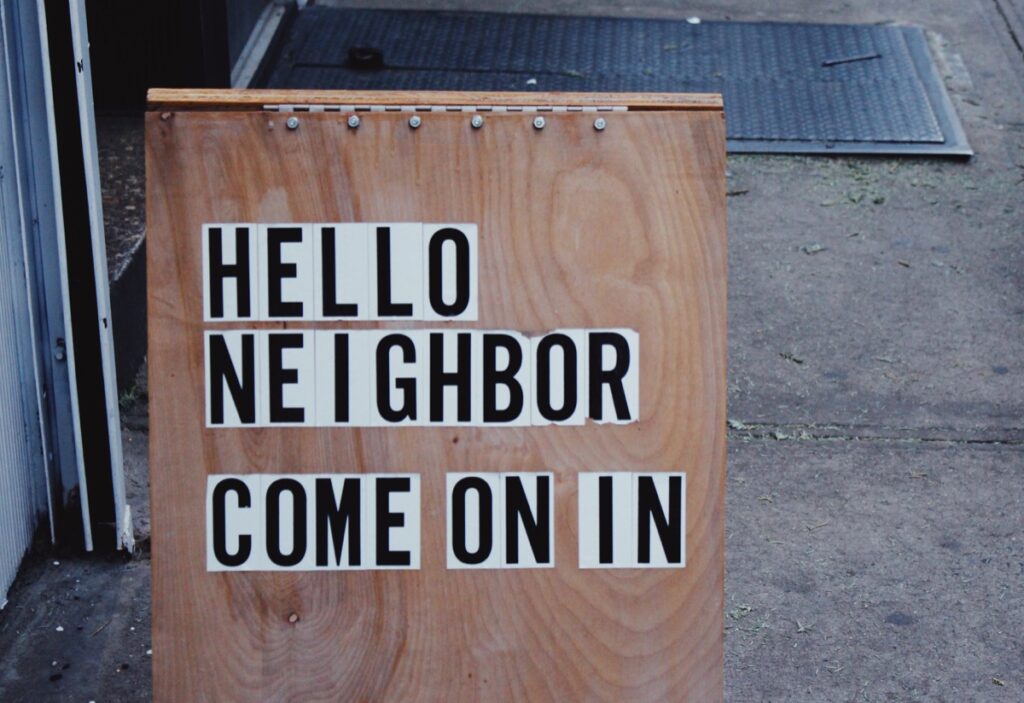For the March instalment of Sprachspielen, I would like to continue the “mini series” that I started last month, speaking about the six components of what we call the “Six-fold Incarnational Strategy,” or for short: 6fis. I gave a rather thorough introduction to the basic philosophy behind the 6fis in last month’s instalment of Sprachspielen. I’m going to be writing this instalment under the assumption that the reader is familiar with what I shared last month about the 6fis in general. If not, I would encourage you to read the February 2021 instalment of this series, as it will give you the background you need to understand and move forward with this month’s editorial.

Last month, we addressed the first point of the 6fis, which is “prayer,” and particularly from a missionary perspective. This month we will continue with the second component of the 6fis, which is the “open home.” Essentially, this is talking about opening our actual homes and lives to others with hospitality and particularly that ever important component of hospitality: food. For this reason and as a rule, we throw lots of dinner parties, teas, brunches, picnics, cookouts, etc., where we often invite both our Christian friends but also and more to the point our friends, who are not yet followers of Jesus, to join us in our homes and around our tables. This, in fact, is one of our very important ways of building personal relationships with people. Obviously, the pandemic has greatly affected this aspect of our personal ministries, as it has pretty much every other avenue for local ministry at the moment. This is one of the reasons that each month, I have been giving an update on how the COVID situation has affected us, sharing about and requesting prayer for the difficulties of building local, one-on-one relationships with people for the sake of the Gospel, when we cannot invite people into our homes, nor visit them in theirs. Consequently, much of what I share here about inviting people into our homes and around our tables is looking back to our general practices before the pandemic, as well as looking forward to a time, when this component of our 6fis will once again be a regular part of our routine.
But why is this kind of sharing of ourselves and our homes and our food such an important and impactful way of relating to our friends, neighbours, work colleagues, acquaintances, and even strangers, and more to the point as an integral part of missions engagement? The answer to that question for me begins with an anecdote from my own experience. When I was a teenager and a relatively new Christian, there was an older, “circuit-riding” (or perhaps more accurately “circuit-driving”) preacher, who led the services at a little, old church near to where I grew up. We had services there every 2nd and 4th Sunday at 2:00 in the afternoon, as it was one of several churches that he helped through the preaching of the Word. He was one of the best preachers I had ever heard, as he could strike the balance beautifully between gentleness and conviction, and he was always speaking in a way that was immediately understandable to his audience, who were primarily farmers in a very rural community in Tennessee. Even though he had advanced degrees in theology and Biblical studies from prestigious institutions, he always remembered his own roots as well as his audience, explaining difficult Biblical truths with a winsomeness that was inviting and intoxicating.

During one of his sermons, I remember his saying the following, which has remained with me across the years: “yet another amazing thing about Jesus is that he never turned anyone down for a meal.” At first the reaction of the congregation was almost one of laughter, thinking that the beloved preacher was setting up a joke for its punchline. However, it quickly became apparent that he was being quite serious and proceeded to expound further on that point. Even to this day, that one, simple statement has often given me pause for reflection and caused me to consider the profound truth born from this crucible of simplicity. I think about people like Simon the Leper (Mark 4:3-9; Matthew 26:6-13), Lazarus and his sisters, Mary and Martha (John 12:1-8), Simon the Pharisee (Luke 7:36-50), Zacchaeus (Luke 19:1-10), and probably most striking, the Last Supper itself (Matthew 26, Mark 14, Luke 22, John 13), a meal of such significance that the entirety of the worldwide Christian community from that original Passover meal with Jesus’ closest disciples to the present day regularly commemorates the event. These are just a few of the most glaring examples from Jesus’ own life and ministry. Suffice it to say, that the importance of times around a table was certainly not lost on Jesus in His own ministry and interactions with a number of people from various backgrounds and on many different levels.
But what is it about eating together that is so powerful especially in a host’s home, where the host has worked with his or her own hands to prepare food for his/her guests, as a labour of love and hospitality? I think one possible step toward answering this question is to consider the egalitarian nature of food. What I mean by this is simply that all humans require food in order to live and for most of us the act of eating is what transports the nutritional value of food to our bodies’ use. It’s something we share, and fairly equally actually. You don’t need to be an “expert” in eating or have specialised skills to do it – it comes naturally. It puts everyone around the table in essentially the same position of both need and expertise (again, it comes naturally), which is fairly rare in life.

I think another reason why hosting and feeding guests is such a powerful experience is the fact that we can model things like kindness, generosity, and especially vulnerability to our guests, both those who already have a personal faith in Christ and, more to the point for our purposes, those who do not currently have a similar, personal faith in Jesus. It is a way for us to model the kind of grace and kindness that God has shown to us in Christ. Through the simple act of providing a basic need to people, we model in microcosm God’s provision to us. Through providing food and welcome to our guests, we model the hospitality and generosity of God, who includes us in His family and Kingdom. Through providing for others at cost to ourselves, we model in small part the incredible lavishness of the Father in His care for us. Finally in being vulnerable in opening our homes and lives to others, sometimes with “the good, the bad, and the ugly” right there for all to see, we demonstrate in the tiniest measure the chosen and embraced vulnerability in the incarnation of God, coming to us as a tiny babe, the one who would grow and teach and serve and be rejected and executed on a cross, as the worst of criminals—the God who gives “till it hurts,” quite literally, and continues to invite us with open arms to fellowship with Him.
I imagine by now you may also be thinking of some reasons of your own as to why this kind of interaction in the home and around the table is so impactful. Regardless of the precise results of such deliberations, what is important to remember is the fact that this kind of interaction is so impactful. I think that we could all agree on that. The cultural context for the early Church was such that hospitality was the norm and in fact expected. It was an everyday part of life. In fact, even to this day, the people of the Middle East, North Africa and the Mediterranean in general, which was the geographic centre of early Christianity, are well-known for their near legendary hospitality to strangers as well as to friends and family alike. Some years ago, I recall some missionary colleagues sharing an experience that they had, whilst on holiday in Israel. They were in a taxi and in a primarily Arabic-speaking city there (Nazareth, if memory serves). They had some missionary colleagues of their own, who had arranged for them to stay with some local believers during their time in the area. Their driver came to a place, where an elderly man was sitting just outside of his front door, which was open. As the driver stopped to get out of the taxi in order to speak with the man, my colleagues assumed this was the place where they were staying, so they got out of the taxi with their bags and entered the house. As it turned out, the taxi driver had just stopped for directions and didn’t actually know the man. However, this man and his wife greeted my colleagues warmly and then prepared a full meal for them, before they went on their way to their actual hosts’ home. Hospitality continues to be a way of life for the people there, much as it was in Biblical times.
Scripture and hospitality

Speaking of the Biblical record, we see clear examples of hospitality at work in the narrative of both the Old and New Testaments. Take the account in Genesis 18:1-8, for example. It is a familiar story and one which serves as a representation of many other similar instances of hospitality mentioned in the Old Testament, too many to list here. In the New Testament as well, we see actual examples of hospitality. Whether it’s Peter’s mother-in-law, who upon being healed of her sickness, immediately sets about serving her guests (Luke 4:38-39), or Martha, who invited Jesus and His disciples to stay with her family (Luke 10:38-42), or Lydia, who upon her conversion, invites Paul and his missionary entourage to stay with her family (Acts 16:13-15). Even when Jesus was sending out the Twelve as apostles (Mark 6, Matthew 10, Luke 9), the expectation of hospitality was so strong that He could send them out (1) with no extra funds or supplies, (2) with the possibility to choose among many options, where they should stay in each town or village, (3) with the possibility to stay with their hosts for as long as they wanted (until they left to go someplace else), and (4) with the strong condemnation of anyone, who does not “receive” (i.e., extend hospitality to) His disciples in their Kingdom mission.
Not only was hospitality a cultural expectation, and as such came naturally, but I certainly think that the power and influence of hospitality and eating together was not lost on the first-century Church in terms of their Kingdom mandate to build the bond of fellowship with other believers, as well as drawing not-yet-believers into the Kingdom through hospitality as a means of strengthening community and an act of inclusion. When we look at Acts, we see it as a testimony to the unstoppable power of the Gospel, through actual numerical growth that was quite dramatic and consistent. Literally the last word of Acts is ἀκωλύτως, which would mean something like “unhinderedly,” which isn’t actually a word in English, but it more closely parallels the Greek meaning. To be certain, this growth was sometimes in conjunction with a specific event, such as Peter’s sermon on Pentecost, where 3000 were converted, baptised and added to the number of believers (Acts 2:41). However, there is not a great deal of detail given in every instance to explain the dramatic and consistent growth. This fact has prompted many scholars to consider that the impetus for the growth of the early Church, at least in human terms, was not as much the extraordinary events, but the day-to-day living out of faith and kindness and graciousness by simple, ordinary believers, who quite naturally and with no discernible commandment to do so winsomely “gossiped the Gospel,” the effect of which was the swelling the ranks of the nascent community of Jesus followers. When we examine the description of this kind of interaction and activity in Acts 2:42-47, immediately following the Pentecost sermon, there are some clear indications of this phenomenon, and the place of “everyday” activities by “everyday” Jesus followers in the growth of the Church in its infancy. The description in verses 46b-47a is particularly telling:
…They broke bread in their homes and ate together with glad and sincere hearts, praising God and enjoying the favour of all the people…
Acts 2:46b-47a
This description bears reference both to hospitality and food as a means of binding believers together, “….praising God,” presumably in the simple act of eating together in their homes, but also as drawing not-yet-believers into community “…and enjoying the favour of all the people.” Through this simple act of food, as hospitality, they are able to welcome both believers in Jesus and more to the point not-yet-believers, giving to the latter group the opportunity to belong even before they believe. The outcome of these efforts, which included the public meeting places and testimony to be sure (“Every day they continued to meet together in the temple courts.” – v. 46a) is stated clearly: “And the Lord added to their number daily those who were being saved” (v. 47b).
With all this said, it begs the question: if hospitality (even the simple act of eating together in homes) is so powerful and clearly a part of the Biblical narrative, why do we feel the need to state it overtly as the “open home” in our 6fis? Simply put, we have to state this overtly for two primary reasons. First, most of the expatriate missionaries that we have serving with us on-field come from a North American context. And second, we have noticed a definite trend over the past 30 years or so primarily in the North American context but also generally in the Northern Hemisphere context, which could only be described as the disappearance of this kind of opening of our homes and tables through hospitality, particularly in the Christian community. This is, of course, not universally true. There are definite exceptions and especially for extraordinary, Church events. For example, I have been a visiting missionary at several missions conferences over the years and have stayed with members of the host church, who were lavish in their kindness and hospitality to me during my time with them. I remain friends with these dear believers from those times even though a great deal of time has passed since many of those interactions, which is a further testament to the power of hospitality to bind people together.

But the decline and even disappearance of hospitality in many Christian circles is true often enough and ever increasingly so as to be identified as a trend in our estimation. In fact, sometimes we call this second component of the 6fis by another name: “the lost art of hospitality.” In the North American Christian context, we continue to do fairly well in opening our homes to extended family and our closest friends, especially our fellow Christians; although, it should be noted that these occasions are increasingly moving outside the home to restaurants and other public spaces, which is nice and has its place, but can never be a wholesale replacement for showing hospitality in opening our homes and tables to others. Whereas generosity is certainly involved in taking friends and family out for a restaurant meal, and again there is a place for this (I enjoy a night out as much as the next person), it simply does not demonstrate the same degree of sacrifice and love that is involved in cooking a meal for guests—there is a real message in the act itself. Obviously, the pandemic has affected us as believers around the world in our usual habits and activities with others, including being able to interact with them, either in their homes or our own, and even in public spaces. Believers in North America/the Northern hemisphere are no exception. Consequently, many of the observations shared here and below are based on general patterns pre-COVID.
Whereas in the North American context and again COVID issues notwithstanding believers have continued to practice some forms of hospitality in homes (though increasingly less so in favour of eating out) primarily with family and close friends, particularly their Christian friends or for special events like missions conferences, there seems to be a clearly missing component in our practice of hospitality. That missing component is the missionary aspect of acts of hospitality in opening our homes, tables and lives to others. The concept of viewing our homes and hospitality as a means of connecting with people who are not currently followers of Jesus and for the sake of the Kingdom’s expansion (a concept which came so naturally to the first-century Jesus followers and for those in similar cultural contexts even to the present day) has become for many of us in many parts of North America/Northern hemisphere in the 21st century an increasingly rare and even foreign one. To illustrate this point, when I am back in the USA, for example, and speaking with believers about the 6fis and its importance to our work in building relationships, and I come to the point of the “open home,” I often use some diagnostic questions to illustrate this concept. I will ask things like, “when is the last time you’ve had a not-yet-follower-of-Jesus, who is not a member of your extended family, in your home for a meal? Or for coffee? or for anything?” Increasingly over the years, the answer to these questions, whether verbalised or not, tends to be essentially “never.”

The only problem is that I’m old enough to remember a time growing up, where it was pretty normal to have guests in our homes for meals and even to stay with us. These times of “fellowship,” as we often called them, included not only family, friends, and other believers, but also people in our broader circles from work, school, social activities and groups, and even strangers in need, most of whom were generally not practicing Christians. Hospitality, especially extended to those in need, was much more of the norm for us “back in the day” and was somewhat expected. It was common, therefore, for us to practice what we presently call the concept of the “open home” from our 6fis, without actually realising it or naming it. For this reason and at the risk of sounding like a grumpy old man speaking about how much better things were “back in my day,” I do feel the need to ask “what happened?” to bring about this change in both attitude and practice, when it comes to opening our homes and tables to outsiders, even strangers with an eye toward the missionary impact of such encounters. Is it possible that the Church in the Northern Hemisphere is mirroring society at large or simultaneously and conversely reacting against society in this regard?
I am no sociologist or expert on the matter, but I have been thinking about this question of what has happened to us and why the concept of “hospitality as mission” or the “open home” seems to be so foreign to us. I have come up with four thoughts on the matter, which I’ll present as succinctly as I can. I am sure there are more points that could be made, but these are the ones that have come to my mind, as I’ve been praying about what to share in this month’s instalment on the “open home” from our 6fis.
Fast-paced lives

I remember reading a rather popular article years ago (probably late 1980s or early 1990s), which was describing some of the “new” technology that would be coming out in the near future. Sadly, I cannot remember the author or exact title of the article, though I certainly remember the gist. He was mentioning things like cell/mobile phones that could be used for more than just talking (and were actually smaller than a World War II military walkie-talkie), as well as pagers, home and even portable computers, and this new thing called the Internet. The main point of the article was to ask the question, “what in the world will we do with all this leisure time that the new technology will create in our lives?” We laugh at this now, though at the time we could understand the reasoning for such a question. However, the “new” technology about which the author of the article wrote has, if anything, accelerated the rhythm of our lives in giving us more room in our schedules simply to fit more and more things in. I can’t remember in my own lifetime another period of time, when we were this busy and our lives so full of activity, much of it online. Seeing how busy we are and how “connected” (might be a misnomer) we are to others through technology, most people these days, Christians included, don’t have time to cook a meal for themselves and their own families anymore, much less to cook for guests and strangers in need. We are in a perpetual state of exhaustion from constant activity and noise. I used to joke (sort of ) that I think the thing that most terrifies those who have known nothing but this kind of lifestyle is silence and stillness. Most of us would not remember what silence and stillness mean, and some have never experienced them in any significant way.
I fear that this phenomenon is actually amplified and accentuated in the lives of Christian leaders in ministry and missions, for whom hospitality is actually a prerequisite for leadership (see below). We plan every waking moment of our days with activity of some kind, going well beyond what would be considered a 40-hour work week. In fact, I’ve been in meetings with other Christian ministers and missionaries, where the discussion turns to sharing how busy each one of us is. It sort of becomes a contest to see who is the most exhausted due to the heaviness of our schedules, and I have to confess that I too have been an active participant in such exchanges on occasion in the past. An outsider looking in at us could be forgiven for assuming that we value “busy-ness” rather than holiness as the primary indicator of a faithful disciple of Jesus and effective leader in His Church.
But we do NOT have to continue at this pace—we can change these life rhythms. The pandemic, as terrible as it has been, has perhaps taught us some positive lessons. One of the most striking areas where we have been most challenged has been in the area of the busy-ness and the fast-paced nature of our lives. Though most of us have still found ways to keep pretty busy during the Pandemic albeit through more remote or virtual means, we have not been able to do ALL of the things that have hitherto kept us running perpetually in circles. Having a bit more time and proximity to be with immediate family members, especially during strict, “stay-at-home” lockdowns, has actually been very good for a lot of people in terms of family relationships. Surveys here in the United Kingdom have indicated that people in general, after they will be able to move around more freely do not necessarily want to go back to every aspect of the “normal” that characterised their lives pre-COVID. Slowing down a bit is one of those takeaways that people are indicating they’d like to continue in their lives, when the COVID situation comes under better and more consistent control. For this reason, as we do move toward the possibility of greater movement and contact, I’d encourage us all to keep the cooking at home and eating together as a household. The next step from there, inviting friends and family and fellow Christians to join you in your home, won’t then seem such a big one to take. And the final step, inviting not-yet-believers-in-Christ to your homes, even strangers in need, will not seem so onerous from that starting point. Rather, it could be an opportunity to allow a progression of ever expanding circles of connection into our lives and homes and around our tables for the sake of the expansion of His Kingdom.
Biblical mandate

Even though most of us as believers in Jesus would recognise that (1) the Bible is filled with actual examples of hospitality, (2) eating together and extending hospitality is powerfully impactful both for the hosts and the recipients of the hospitality, and (3) the act of hospitality and eating together was common practice in the early Church in terms of its work of expanding the Kingdom, somehow we still look at hospitality as a personal choice, which can be embraced or rejected. Many of us might even think, “after all, it’s not like the Bible actually tells us to be hospitable.” It’s understandable that we might think this way. After all, when is the last time you heard a sermon or read a Bible study about hospitality? If the topic comes up at all, it’s usually as a sub point in a broader message, and even then it’s mentioned as a means of helping and strengthening the bond of fellowship with other believers in Jesus. It is rare to the point of non-existence that there is preaching or teaching or writing focused on the use of hospitality as an element of missions and our homes as outposts of the Kingdom. It is understandable, therefore, how we might simply assume that the extending of hospitality in our own homes is a matter of personal preference, ability, resources, etc., rather than a matter of obedience.
However, we would be wrong in that assumption. Besides the numerous examples of hospitality and eating together that we find in both the Old and New Testaments, there are plenty of instances, where God’s people are actually commanded to be hospitable and helpful, especially to strangers and those in need, as well as with fellow believers. In the Mosaic law, there are a number of passages related to how to treat the sojourner, foreigner and stranger in their midst; e.g., “Love the sojourner, therefore, for you were sojourners in the land of Egypt,” Deuteronomy 10:19 (see also Leviticus 19:10, 19:33-34, 24:22; Exodus 22:21, et al.), not to mention numerous examples of such hospitality actually being extended, as already mentioned. We see this kind of care as an example of justice and righteousness in the Prophets as well.
Is it not to share your bread with the hungry and bring the homeless poor into your house; when you see the naked, to cover him, and not to hide yourself from your own flesh?
Isaiah 58:7
Turning to the New Testament, there are actually a few Greek terms, which are generally and accurately translated as “hospitality,” “hospitable,” “showing hospitality,” etc. The New Testament actually takes the matter one step further than the Old Testament. There are three passages, which give a pretty clear mandate, when it comes to hospitality:
- “Contribute to the needs of the saints and seek to show hospitality.” – Romans 12:13
- “Show hospitality to one another without grumbling.” – 1 Peter 4:9
- “Do not neglect to show hospitality to strangers, for thereby some have entertained angels unawares.” – Hebrews 13:2
Perhaps a bit more pointedly, hospitality is actually mentioned as one of the prerequisite qualities of a leader in the Church (ἐπίσκοπος), and in case we didn’t get it the first time, Paul mentions it twice in 1 Timothy 3:2 and Titus 1:8.
In terms of the New Testament, the examples mentioned above are just those that use the actual term “hospitality” and its related forms. There are many other passages, where hospitality, especially toward those in need, is described very clearly, even if the word itself is not used. Probably one of the most striking examples of this is found in Matthew 25:31-26. This text is often described as the “Judgement of Nations” or “the Separating of the Sheep from the Goats.” The passage is probably quite familiar to most of us. Jesus, sitting in judgement, makes the distinction between the two groups based on whether they performed (or not) certain acts toward “the least of these,” and in so doing performed them (or not) toward Jesus Himself. Jesus gives six criteria by which all are judged and deemed either righteous or not, depending on whether they demonstrated these things again to “the least of these.” Of those six criteria, the first three, half of them, relate directly to issues of hospitality:
- “I was hungry and you gave me something to eat” (v. 35)
- “I was thirsty and you gave me something to drink” (v. 35)
- “I was a stranger and you invited me in” (v. 35)
This is the positive side of the equation. The negative side uses the same criteria. Again, it’s a pretty striking example.
Consequently, even from this very cursory examination of the Scriptures, I think it’s pretty clear that God intends for His people to show hospitality, and it’s really not simply a personal choice or preference or one that we can either “take or leave” as we choose, at least not if we are really serious about walking in obedience to the Lord.
Compartmentalisation

I am really going to introduce this concept here and rather quickly, because I will deal with it in more detail in future instalments looking at the next components of the 6fis. However, as we have become increasingly busy and running all the time in our lives, we have compartmentalised many aspects of our lives. We also have assigned a certain place or “space” to these compartments of activity. Here are some of these compartments and their associated space:
| Compartmentalised Activity | Location of Activity |
| Working | Work space |
| Learning (implies more full-time study and not applicable to all) | Academic space |
| Practicing religion/faith | Religious space |
| Socialising | Public or social space (sometimes also called “third space”) |
| Family | Personal or intimate space (generally one’s home) |
In terms of where these different activities and aspects of life happened (location), there was a time, when some of these lines were more blurred, while others more rigid. During the Pandemic, there has been some return to that spectrum between blurred and rigid lines of demarcation, related to space/location for each of these categories of activity. However, in the run up to the current Pandemic, particularly in the Christian community, most of these lines became more rigid, and some compartments of activity became either disproportionally smaller or larger than their counterparts. Accordingly, there was less mixing of the people in our lives from these various compartments of activity, which has had a direct effect on the issue of hospitality.
I will pick up with this theme in future instalments looking at the component of the 6fis.
A man’s home is his castle

I think many of us, particularly coming from a North American context, have heard the above saying at some point, it’s lack of inclusivity notwithstanding. Over the past few decades particularly in North American Christian life, there has been a widening chasm between us (Christians) and them (Not-Christians, or “the world”). This dichotomisation has affected many aspects of the life of believers and the Church, from evangelism and missions (now too often forms of short forays into “the world” much like guerrilla warfare, with a quick return to the “safety of the fold” with no other “mixing” between the two groups, or at least as little as possible), to where and how we spend our time, and even to our personal relationships with people, both Christians and more to the point not-yet-believers-in-Jesus. As the lines of demarcation become more specific, entrenched and sacrosanct between us and them, the more Christians embrace a sense of isolation, detachment, and “circling the wagons.” As we watch “their” side grow in numbers and general influence, and “our” side decrease in both numbers and general influence, we have a genuine fear of losing our “way of life,” which pushes us ever deeper into our private space. To keep the metaphor of the castle, we definitely embrace that imagery in many ways, but also dig a metaphorical moat around our home, pull up the draw bridge at night, and post archers on the walls to make sure no one from the outside comes in or disturbs the safety and isolation of our sanctuary. Accordingly, the idea of inviting into our homes anyone, besides our own families and the very closest of friends, can seem not only foreign but actually dangerous and as such to be avoided, if at all possible. I’m not saying that there isn’t a place for quiet, rest, refuge from time to time. Jesus Himself sought out such times of solitude for prayer, rest and communion with the Father. However, just as with Jesus’ own example, we as His people are not to set our default on isolation and retreat, but on engagement and openness and, yes, even taking risks from time to time – all for the sake of the Gospel and the expansion of His Kingdom.

I would like to close this look at the “open home” from our 6fis and the nature of hospitality in missions in general with a bit of a challenge. The challenge comes from the terms in the Greek New Testament, which are generally translated as “hospitality” or the adjectival form “hospitable,” which I noted above. These terms are φιλοξενία and φιλόξενος respectively. Both terms come from exactly the same root words; so, a bit of Greek etymology is in order, especially looking at the literal meaning of the two components of these terms. The first is φίλος, which is generally translated as “friend” or “one who loves,” and it is tied to the word φιλία, which is one of the various words in Greek for love (if you’d like to learn more about this subject, I can highly recommend one of my favourite books and authors, “The Four Loves,” by C.S. Lewis). The second component is ξένος, which means more generally “stranger” or probably more precisely “foreigner.” It is the same Greek root for the English term, “xenophobia,” which is an irrational fear or hatred of foreigners and all things foreign. I immediately was struck by the power of a literal take on the etymology of the term, which is “a love for strangers/foreigners” or “one who loves strangers/foreigners.”
Though I find etymology of words and the literal definitions of those roots to be interesting, I would rarely suggest taking on the literal meanings of these lexical roots. However, in this case and herein is the challenge, I wonder what would happen if we practiced hospitality in our homes and around our tables in such as way, that those who are not yet followers of Christ would characterise our hospitality as “a love for strangers/foreigners” and us as “the people who love strangers/foreigners?” Accordingly, we embrace this sense of “open home” here in our work, and I think that I can speak for all of us, when i say that we can hardly wait for the COVID situation to improve to the place, where we can once again practice this kind of hospitality as mission. To that end, I would ask you to join us in prayer. But even as we prepare here to resume these types of interactions in our homes, I pray that wherever you might be and as you come out of the worst of the COVID restrictions where you are, perhaps, this instalment of Sprachspielen might inspire some of you, who are reading it, to make plans to incorporate more hospitality and food in your lives as you open your homes, not just to believers but also to your friends/co-workers/colleagues, who are not-yet-believers-in-Jesus and even to the stranger in need. I feel that it is perfectly appropriate that the people in our circles of relationship, who might already see us as “followers of Jesus” would also see us, following His example, as “those who love strangers/foreigners” by opening our homes and lives to them.
With that said and until next time, I suppose my last words to you would be “Bon appétit!”
